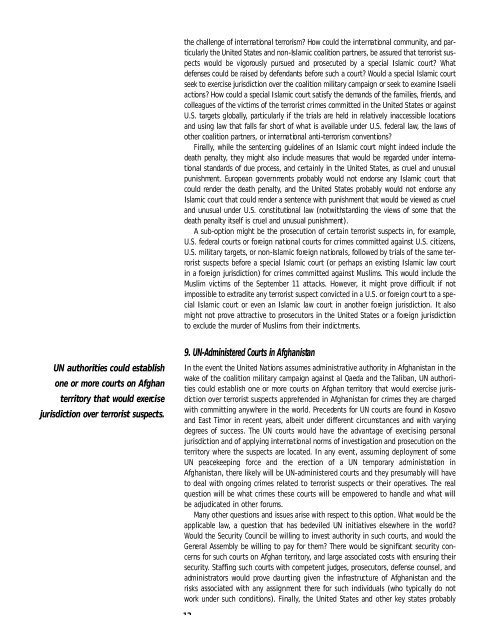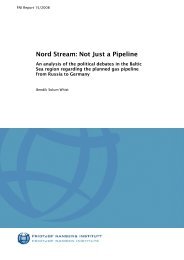David Scheffer Options for Pro secuting International Te r ro rists B ...
David Scheffer Options for Pro secuting International Te r ro rists B ...
David Scheffer Options for Pro secuting International Te r ro rists B ...
You also want an ePaper? Increase the reach of your titles
YUMPU automatically turns print PDFs into web optimized ePapers that Google loves.
UN authorities could esta b l i s h<br />
one or more courts on Afg h a n<br />
t e r r i tory that would exe rc i s e<br />
jurisdiction over ter<strong>ro</strong>rist suspects.<br />
t he challenge of int e r na t io nal ter<strong>ro</strong>rism? How could the int e r na t io nal commu n i t y, and part<br />
icularly the United States and no n - Is l a m ic coalition partne r s, be assured that ter<strong>ro</strong>rist suspects<br />
would be vigo <strong>ro</strong>usly pursued and p<strong>ro</strong>secuted by a special Is l a m ic court? What<br />
de f e nses could be raised by de f e nda nts befo re such a court? Would a special Is l a m ic court<br />
seek to exe rcise jurisdic t ion over the coalition military campaign or seek to exa m i ne Is ra e l i<br />
a c t io ns? How could a special Is l a m ic court satisfy the de ma nds of the fa m i l ie s, frie nd s, and<br />
colleagues of the vic t i ms of the ter<strong>ro</strong>rist crimes committed in the United States or agains t<br />
U.S. targets globally, particularly if the trials are held in relatively inaccessible locatio ns<br />
a nd using law that falls far short of what is available under U.S. fede ral law, the laws of<br />
o t her coalition partne r s, or int e r na t io nal ant i - t e r <strong>ro</strong>rism convent io ns?<br />
F i na l l y, while the sent e nc i ng guide l i nes of an Is l a m ic court mig ht indeed inc l ude the<br />
death pena l t y, they mig ht also inc l ude me a s u res that would be re g a rded under int e r nat<br />
io nal standa rds of due p<strong>ro</strong> c e s s, and certainly in the United States, as cruel and unu s ua l<br />
p u n i s h me nt. Eu<strong>ro</strong>pean go v e r n me nts p<strong>ro</strong>bably would not endorse any Is l a m ic court that<br />
could re nder the death pena l t y, and the United States p<strong>ro</strong>bably would not endorse any<br />
Is l a m ic court that could re nder a sent e nce with punishme nt that would be viewed as cruel<br />
a nd unu s ual under U.S. cons t i t u t io nal law (no t w i t hs t a nd i ng the views of some that the<br />
death penalty itself is cruel and unu s ual punishme nt ) .<br />
A sub-option mig ht be the p<strong>ro</strong> s e c u t ion of certain ter<strong>ro</strong>rist suspects in, <st<strong>ro</strong>ng>for</st<strong>ro</strong>ng> exa m p l e,<br />
U.S. fede ral courts or fo re ign na t io nal courts <st<strong>ro</strong>ng>for</st<strong>ro</strong>ng> crimes committed against U.S. citizens,<br />
U.S. military targe t s, or no n - Is l a m ic fo re ign na t io na l s, followed by trials of the same ter<strong>ro</strong>rist<br />
suspects befo re a special Is l a m ic court (or perhaps an ex i s t i ng Is l a m ic law court<br />
in a fo re ign jurisdic t ion) <st<strong>ro</strong>ng>for</st<strong>ro</strong>ng> crimes committed against Mu s l i ms. This would inc l ude the<br />
Muslim vic t i ms of the September 11 attacks. Ho w e v e r, it mig ht p<strong>ro</strong>ve difficult if no t<br />
impossible to ex t radite any ter<strong>ro</strong>rist suspect convicted in a U.S. or fo re ign court to a spec<br />
ial Is l a m ic court or even an Is l a m ic law court in ano t her fo re ign jurisdic t ion. It also<br />
m ig ht not p<strong>ro</strong>ve attractive to p<strong>ro</strong>secutors in the United States or a fo re ign jurisdic t io n<br />
to exc l ude the mu rder of Mu s l i ms f<strong>ro</strong>m their ind ic t me nt s.<br />
9. UN-Ad m i n i s t e red Courts in Afg h a n i s ta n<br />
In the event the United Na t io ns assumes adm i n i s t rative authority in Afghanistan in the<br />
w a ke of the coalition military campaign against al Qaeda and the Taliban, UN autho r it<br />
ies could establish one or mo re courts on Afghan territory that would exe rcise jurisd<br />
ic t ion over ter<strong>ro</strong>rist suspects appre he nded in Afghanistan <st<strong>ro</strong>ng>for</st<strong>ro</strong>ng> crimes they are charge d<br />
with committing any w he re in the world. Pre c e de nts <st<strong>ro</strong>ng>for</st<strong>ro</strong>ng> UN courts are fo u nd in Ko s o v o<br />
a nd East Timor in re c e nt years, albeit under differe nt circ u ms t a nces and with varying<br />
de g rees of suc c e s s. The UN courts would have the advant a ge of exe rc i s i ng persona l<br />
j u r i s d ic t ion and of applying int e r na t io nal no r ms of investig a t ion and p<strong>ro</strong> s e c u t ion on the<br />
territory whe re the suspects are located. In any event, assuming de p l o y me nt of some<br />
UN peaceke e p i ng fo rce and the ere c t ion of a UN temporary adm i n i s t ra t ion in<br />
A fghanistan, the re likely will be UN-adm i n i s t e red courts and they pre s u mably will have<br />
to deal with ongo i ng crimes related to ter<strong>ro</strong>rist suspects or their opera t i v e s. The re a l<br />
q u e s t ion will be what crimes these courts will be empowered to handle and what will<br />
be adjud icated in other fo r u ms.<br />
Ma ny other questio ns and issues arise with respect to this option. What would be the<br />
a p p l icable law, a question that has bedeviled UN initiatives elsewhe re in the world?<br />
Would the Security Council be willing to invest authority in such courts, and would the<br />
G e ne ral Assembly be willing to pay <st<strong>ro</strong>ng>for</st<strong>ro</strong>ng> them? The re would be sig n i f ic a nt security conc<br />
e r ns <st<strong>ro</strong>ng>for</st<strong>ro</strong>ng> such courts on Afghan territory, and large associated costs with ens u r i ng the i r<br />
s e c u r i t y. Staffing such courts with competent judge s, p<strong>ro</strong> s e c u t o r s, de f e nse counsel, and<br />
a dm i n i s t rators would p<strong>ro</strong>ve da u nt i ng given the infra s t r uc t u re of Afghanistan and the<br />
risks associated with any assig n me nt the re <st<strong>ro</strong>ng>for</st<strong>ro</strong>ng> such ind i v iduals (who typically do no t<br />
work under such cond i t io ns). Fina l l y, the United States and other key states p<strong>ro</strong> b a b l y<br />
1 2













